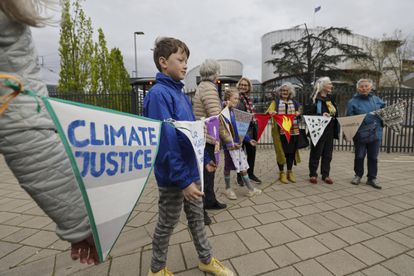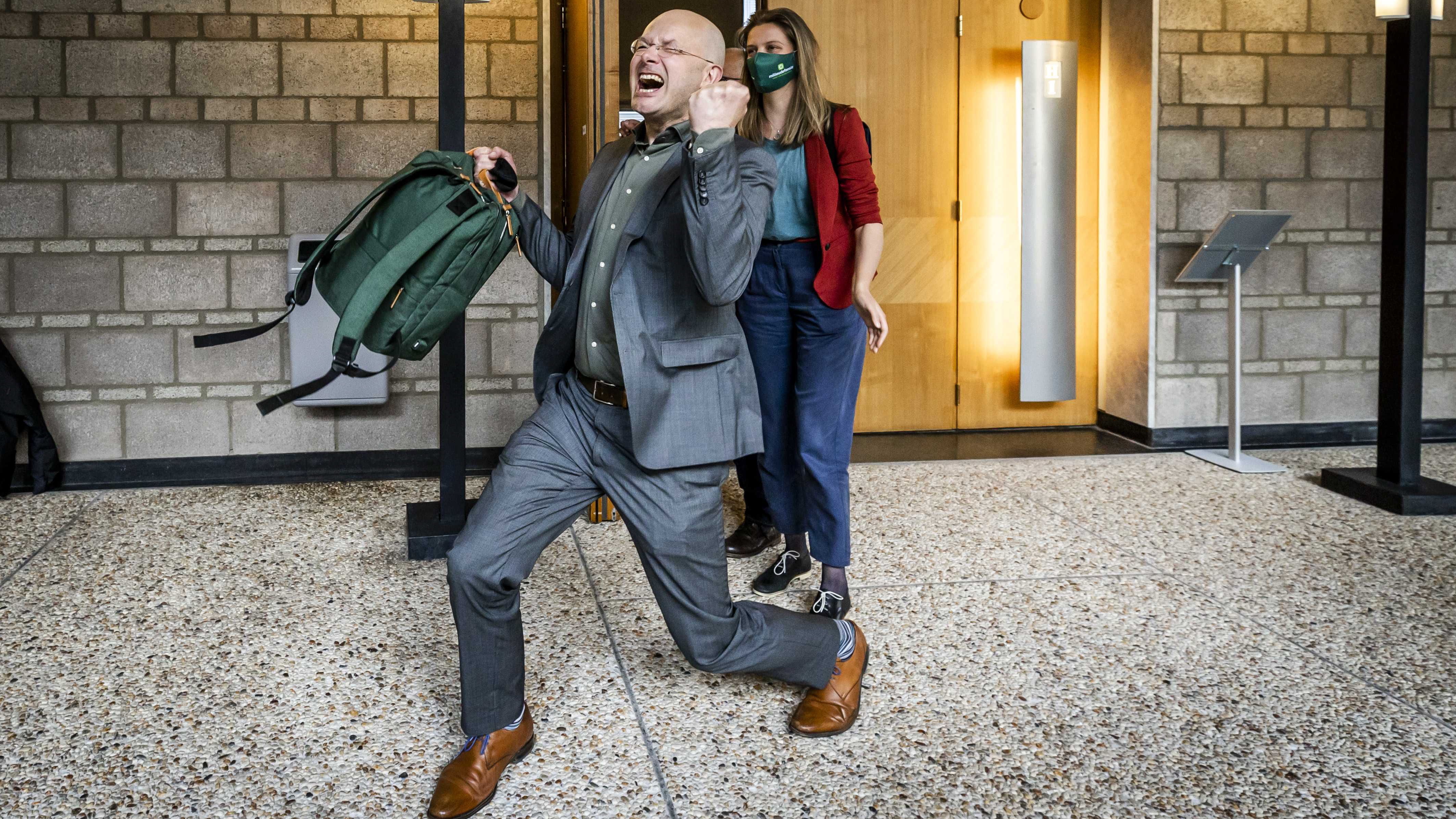Before the victory of an association of Swiss ladies with an average age of 73 years this week at the European Court of Human Rights (ECHR) in Strasbourg, there were already other historic rulings in favor of groups of citizens and associations that led to their governments to justice for the climate emergency. From a handful of young people or small local organizations to large social groups backed by millions of signatures. Citizens concerned about the insufficient response of countries to the threat of climate change have exposed in court the governments of the Netherlands, France, Germany, and some States of USAof Belgium… Except in Spain, where the Supreme Court ruled in favor of the Administration last summer against environmentalists in the country's first climate litigation, there are already many precedents in which judges rule in favor of citizens' demands for Governments fulfill their responsibility to protect the population from global warming. And it is expected that there will be many more the proliferation of climate litigation. Of what use have these victories in court really been? In most cases, they have not resulted in significant changes in policies to reduce emissions that cause climate change, but they have had other important impacts.
“Although sentences and sentences in climate litigation are not always accompanied by a reaction from States, they are useful because they create political pressure that is difficult to achieve in other ways,” says Justine Ripoll, representative of Notre affaire à tousa French organization that uses law to increase action against climate change and one of the entities—along with Oxfam and Greenpeace France—that got the French State condemned in court for failing to meet its climate commitments in the so-called case of the centurya citizen movement supported with 2.3 million signatures.
The first of these great victories for citizens occurred in 2015 in the Netherlands, in a ruling later endorsed by its Supreme Court in 2019. Urgenda, a small local NGO without international affiliates, managed to get the court to force the Dutch Government to reduce the country's greenhouse gas emissions by at least 25% by the end of 2020, compared to 1990 levels, based on human rights. When the end of 2020 came, this country recorded a reduction of 25.5%, but not due to greater ambition in its climate policies, but mainly due to low gas prices (which led to less use of coal), a warm winter and the covid pandemic. The sentence was carried out, without undertaking major reforms against climate change.
However, Urgenda's victory continues to be very present in this country, as the Dutch Minister of Climate and Energy, Rob Jetten, himself stressed a few days ago in a meeting with Spanish journalists attended by EL PAÍS. According to Jetten, that Supreme Court ruling continues to impact climate policies for the coming years, “because its effect lasts over time.” “Every year a national report is published on the evolution of emissions, and if we do not comply with the cuts, many other people can go to court to get the Government to do so,” highlighted the minister, who assured that now reinforced the Climate Law with the commitment to reduce emissions by 55% by 2030.
In France, in 2021, the administrative court of Paris ruled against the State for failing to meet its climate commitments and ordered it to compensate for the 15 million tons of CO₂ emitted in excess of the 2015-2018 objectives. However, the so-called case of the century did not entail major changes in climate policies in this country either. And in 2023, the same court rejected a request from the plaintiff organizations to sanction the French State with 1.1 billion euros, considering that the delays in compliance were being offset by the lower emissions of the first half of that year, again largely achieved. due to situational factors.
Information is the first tool against climate change. Subscribe to it.
Subscribe
“What impact has this ruling had in France?” asks Justine Ripoll, who then answers: “It has not gotten the French Government to take additional measures, but it has had a political impact. “It has served to make the climate a central issue, to see every year if the State respects its commitments and to ask ourselves if the measures we have taken are sufficient to meet the 2030 objectives.”
As the representative of the organization says Notre affaire à tous, “now in France the Council of State is going to ask the Government every year in court what it has done and if the Government is too late in its commitments, economic sanctions will be imposed or specific measures will be requested, such as reducing the transportation or put more money into the rehabilitation of buildings.” “Politically, it is difficult for the Government to say now that it is doing well with the climate, since there are judges who have concluded otherwise,” says the Frenchwoman. “In the public debate, the victory in the courts has given a lot of strength to all the people who work on these issues and who negotiate with politicians.”
Another effect of these sentences has to do with activists who are in turn taken to court for their actions of civil disobedience or sabotage in protest of countries' too slow action to reduce emissions. “Police repression has increased greatly in France against these activists, but when they are brought to justice they are often not sentenced because the judges take into account the fact that the French State itself is committing an illegality and trying to cover up its failures by charging against the militants who remember that he has been convicted in court.”

In the case of Belgium, the Brussels Court of Appeal ruled in 2023 that the Belgian State and the regions of Flanders and Brussels did not make sufficient efforts to cut greenhouse gases in 2020 and forced them to respect the objective of reducing their emissions. by 55% in 2030, compared to 1990 values. For Sarah Tak, coordinator of Klimaatzaak, the organization that promoted the citizen initiative that achieved this legal victory, “the ruling clarified that the climate crisis is a human rights crisis and that our Government will have to drastically increase both climate action and ambition.” According to this activist, “since the international climate regulatory framework does not provide for binding reduction targets, national rulings such as that of the Brussels Court of Appeal can be of utmost importance in filling the governance gap. “The Belgian federal and regional governments are now legally obliged to take their share of responsibility in the collective mission of keeping global warming below the dangerous temperature limit of 1.5°C.” “This is truly important and will catalyze our national policy for the rest of this decade,” says Tak, who assures that the court also opened a follow-up procedure in which it will evaluate policies and intermediate objectives for the period 2022 to 2024 and announced that it could impose periodic penalty payments in case of non-compliance.
Despite the effects that these rulings do have in driving climate action, some jurists are more doubtful about the strategy of continually taking governments to court to force them to take more action against climate change. Ana Barreira, lawyer and director of the International Institute of Law and Environment (IIDMA), considers that “too much noise is being raised” with rulings such as this week's ECtHR, which assures that it only affects Switzerland, with sometimes wrong interpretations. . “We must be more ambitious in the fight against climate change, I am not a skeptic or a denier, but I believe that we must make a transition that does not generate social rejection, because, if not, we are going to ruin everything we have been working on.” for many years in Europe,” comments the lawyer, who believes it is counterproductive to force governments to take drastic measures that entail major changes in society through sentences.
For Belgian Sarah Tak, “the Strasbourg judges clearly confirmed the obligation of governments to effectively protect their citizens from climate change”, which implies much more drastic reductions in emissions, as requested by climate science. “Although it is only binding for Switzerland, the verdict impacts the climate governance of the 46 member states of the Council of Europe,” considers the activist. “And it will undoubtedly spark a new generation of national climate lawsuits.”
Shell oil company resource

Climate litigation is not only against governments, but also against some companies. An example of the trail left by historic rulings such as Urgenda in the Netherlands was the appeal presented to the courts in 2018 by Milieudefensie, the Dutch branch of Friends of the Earth, against the oil company Shell. On this occasion, six other environmental organizations and more than 17,000 individuals joined the lawsuit, alleging that Shell has known since the 1960s that oil and gas extraction has harmful effects on the climate. The result was another ruling described as historic in 2021, in which a court in The Hague concluded that the oil company has the obligation to contain the pollution generated by its activities, and must also influence that produced by its suppliers and customers. What happened with this sentence? Almost three years after the ruling, the case is back in court. This Friday the hearings of the appeal presented by Shell concluded and the judges will deliberate from now on.
You can follow Climate and Environment in Facebook and xor sign up here to receive our weekly newsletter
Subscribe to continue reading
Read without limits
_
#Climate #disputes #surround #governments #achieving #significant #measures











